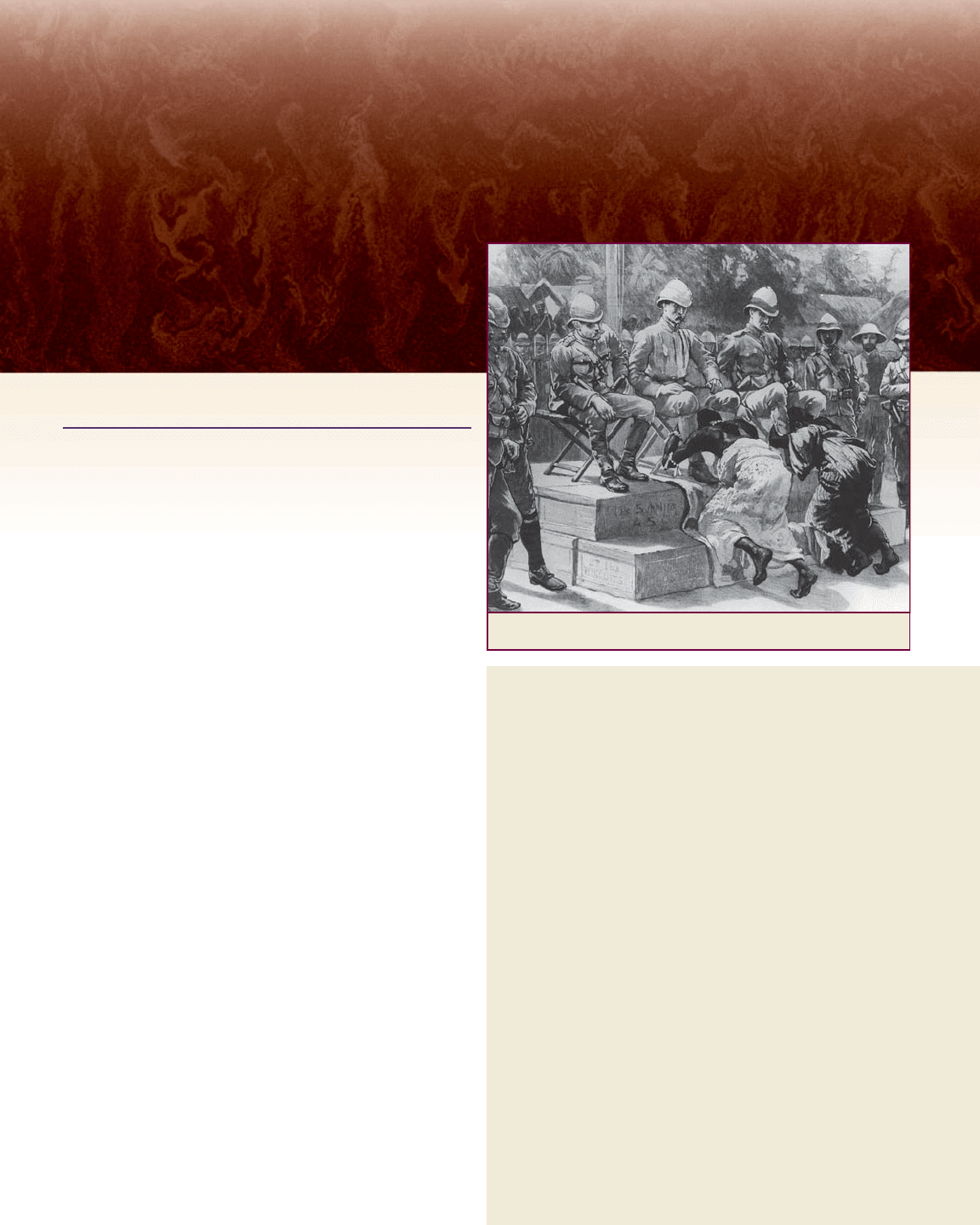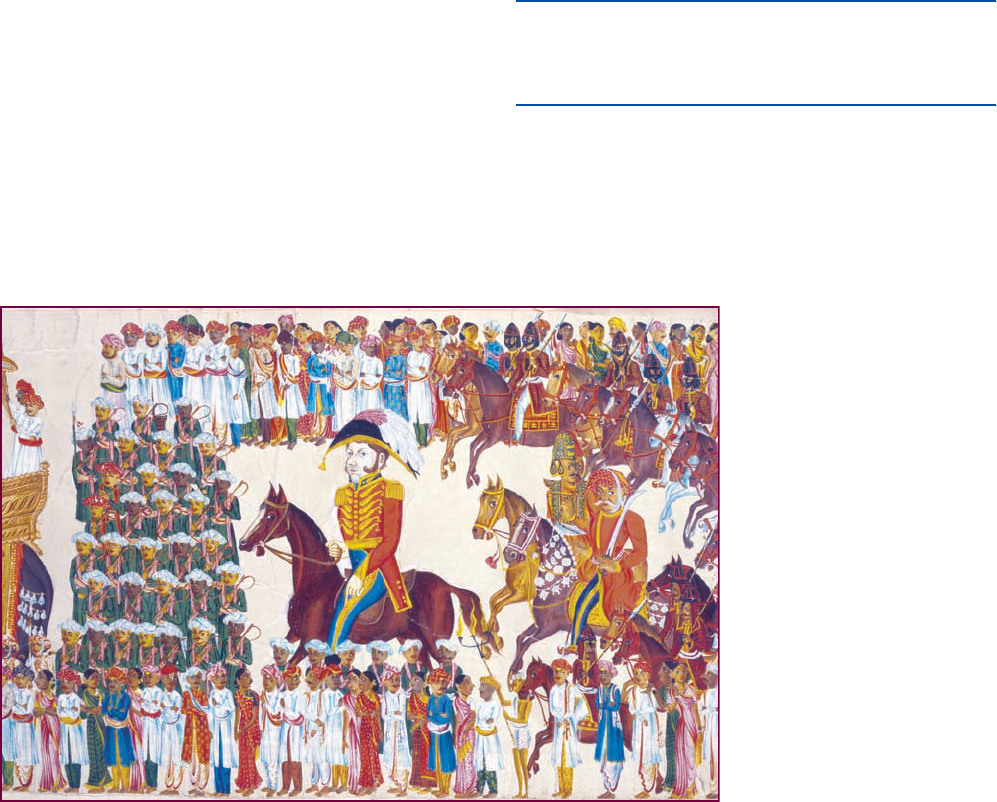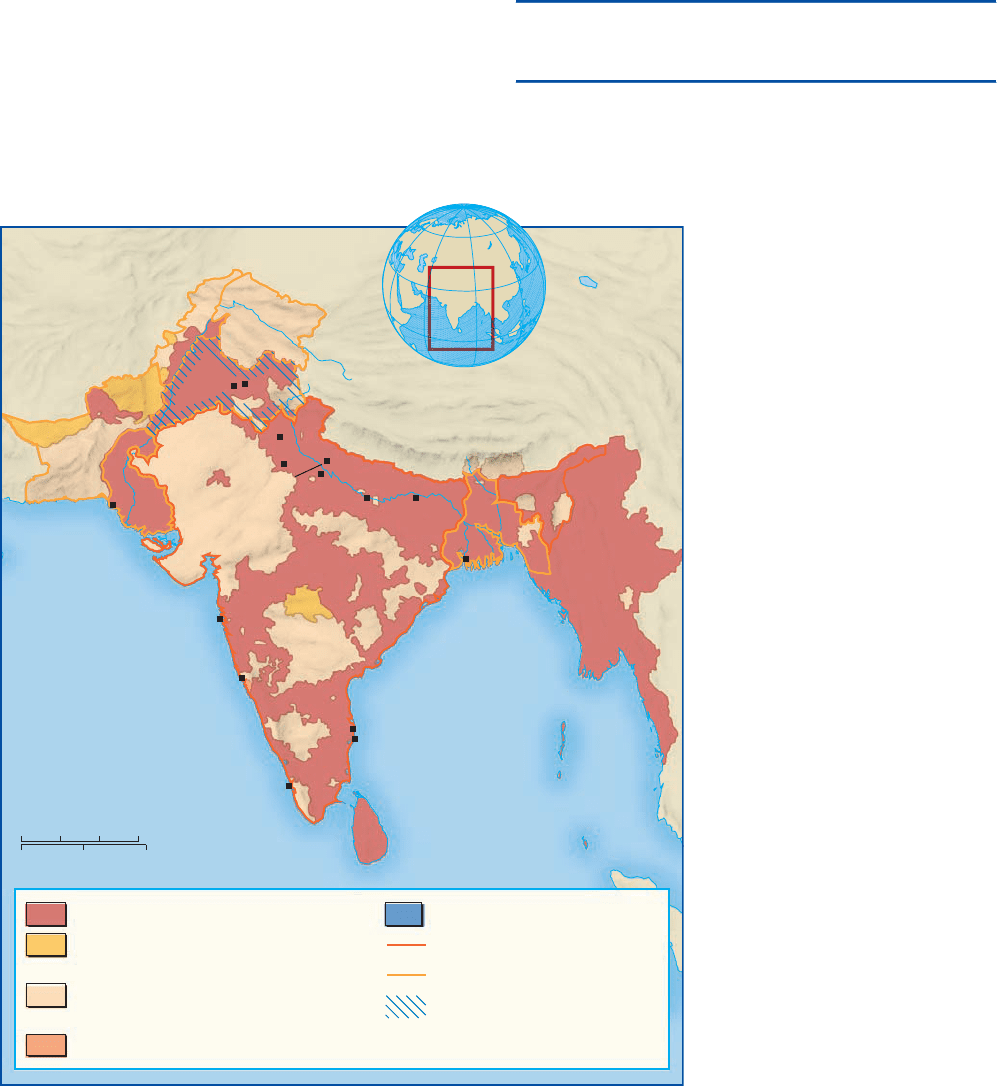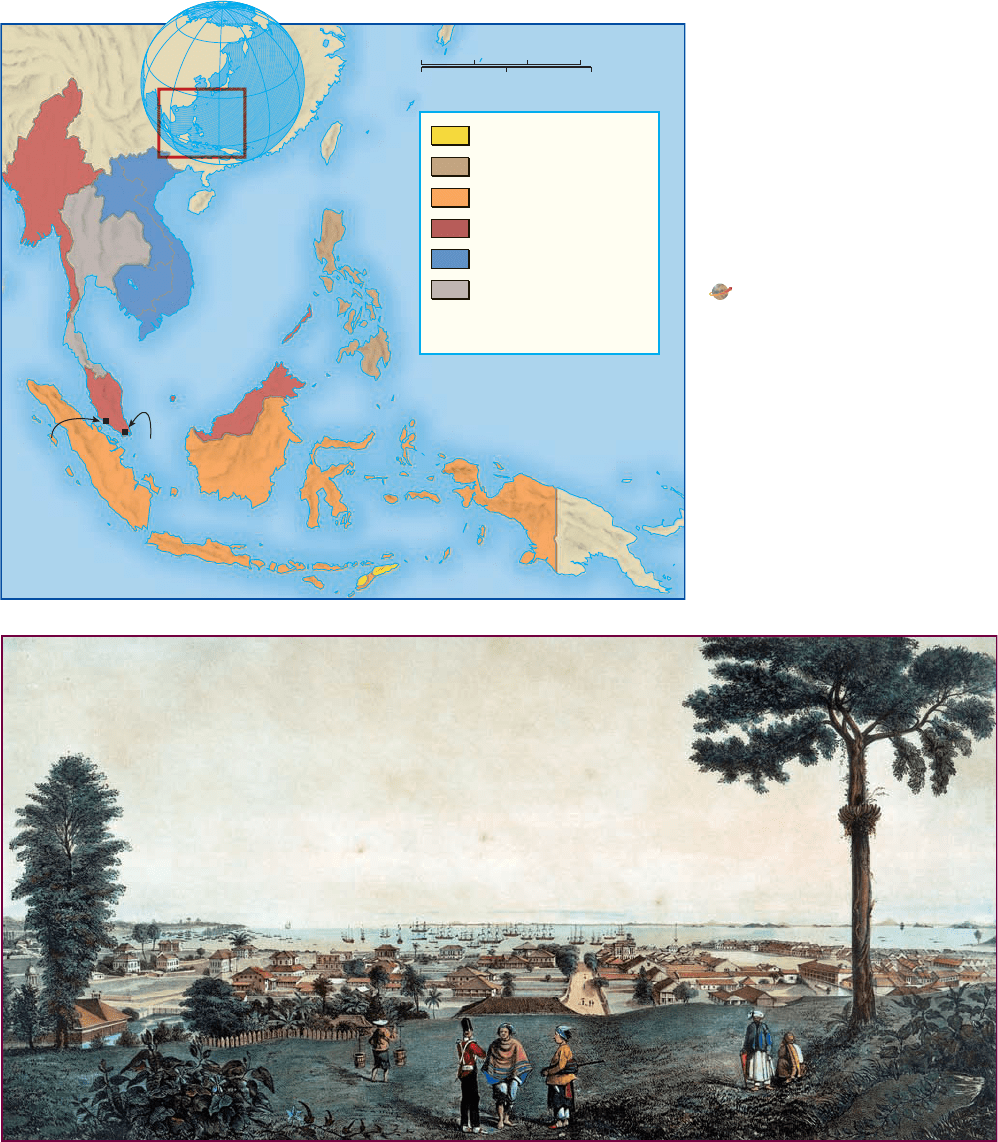Duiker William J., Spielvogel Jackson J. The Essential World History
Подождите немного. Документ загружается.


CHAPTER 21
THE HIGH TIDE OF IMPERIALISM
CHAPTER OUTLINE
AND FOCUS QUESTIONS
The Spread of Colonial Rule
Q
What were the causes of the new imperialism of the
nineteenth century, and how did it differ from European
expansion in earlier periods?
The Colonial System
Q
What types of administrative systems did the various
colonial powers establish in their colonies, and how
did these systems reflect the general philosophy of
colonialism?
India Under the British Raj
Q
What were some of the major consequences of British
rule in India, and how did they affect the Indian people?
Colonial Regimes in Southeast Asia
Q
Which Western countries were most active in seeking
colonial possessions in Southeast Asia, and what were
their motives in doing so?
Empire Building in Africa
Q
What factors were behind the ‘‘scramble for Africa,’’ and
what impact did it have on the continent?
The Emergence of Anticolonialism
Q
How did the subject peoples respond to colonialism,
and what role did nationalism play in their response?
CRITICAL THINKING
Q
What were the consequences of the new imperialism
of the nineteenth century for the colonies and the
colonial powers? How do you feel the imperialist
countries should be evaluated in terms of their motives
and stated objectives?
Revere the conquering heroes: Establishing British rule in Africa
c
Time & Life Pictures/Getty Images
514
IN 1877, THE YOUNG British empire builder Cecil Rhodes
drew up his last will and testament. He bequeathed his fortune,
achieved as a diamond magnate in South Africa, to two of his close
friends and acquaintances. He also instructed them to use the inher-
itance to form a secret societ y with the aim of bringing about ‘‘the
extension of British rule throughout the world, the perfecting of a
system of emigration from the United Kingdom ...especially the
occupation by British settlers of the entire continent of Africa, the
Holy Land, the valley of the Euphrates, the Islands of Cyprus and
Candia [Crete], the whole of South America. ... The ultimate recov-
ery of the United States of America as an integral part of the British
Empire ...then finally the foundation of so great a power as to
hereafter render wars impossible and promote the best interests of
humanity.’’
1
Preposterous as such ideas sound today, they serve as a graphic
reminder of the hubris that characterized the worldview of Rhodes
and many of his contemporaries during the age of imperialism, as
well as the complex union of moral concern and vaulting ambition
that motivated their actions on the world stage.
Through their efforts, Western colonialism spread throughout
much of the non-Western world during the nineteenth and early
twentieth centuries. Spurred by the demands of the Industrial

The Spread of Colonial Rule
Q
Focus Question: What were the causes of the new
imperialism of the nineteenth century, and how did it
differ from European expansion in earlier periods?
In the nineteenth century, a new phase of Western ex-
pansion into Asia and Africa began. Whereas European
aims in the East before 1800 could be summed up in
Vasco da Gama’s famous phrase ‘‘Christians and spices,’’
now a new relationship took shape as European nations
began to view Asian and African societies as sources of
industrial raw materials and as markets for Western
manufactured goods. No longer were Western gold and
silver exchanged for cloves, pepper, tea, silk, and porce-
lain. Now the prodigious output of European factories
was sent to Africa and Asia in return for oil, tin, rubber,
and the other resources needed to fuel the Western
industrial machine.
The Motives
The reason for this change, of course, was the Industrial
Revolution. Now industrializing countries in the West
needed vital raw materials that were not available at home,
as well as a reliable market for the goods produced in their
factories. The latter factor became increasingly crucial as
producers began to disco v er that their home markets
could not always absorb domestic output and that they
had to export their manufactures to make a profit.
As Western economic expansion into Asia and Africa
gathered strength during the nineteenth century, it be-
came fashionable to call the process imperialism. Al-
though the term imperialism has many meanings, in this
instance it referred to the efforts of capitalist states in the
West to seize markets, cheap raw materials, and lucrative
avenues for investment in the countries beyond Western
civilization. In this interpretation, the primary motives
behind the Western expansion were economic. Promoters
of this view maintained that modern imperialism was a
direct consequence of the modern industrial economy.
As in the earlier phase of Western expansion, how-
ever, the issue was not simply an economic one. Eco-
nomic concerns were inevitably tinged with political
overtones and with questions of national grandeur and
moral purpose as well. In the minds of nineteenth-
century Europeans, economic wealth, national status, and
political power went hand in hand with the possession of
a colonial empire. To global strategists, colonies brought
tangible benefits in the world of balance-of-power politics
as well as economic profits, and many nations became
involved in the pursuit of colonies as much to gain
advantage over their rivals as to acquire territory for its
own sake.
The relationship between colonialism and national
survival was expressed directly in a speech by the French
politician Jules Ferry in 1885. A policy of ‘‘containment or
abstinence,’’ he warned, would set France on ‘‘the broad
road to decadence’’ and initiate its decline into a ‘‘third-
or fourth-rate power.’’ British imperialists, convinced by
the theory of social Darwinism that in the struggle be-
tween nations, only the fit are victorious and survive,
agreed. As the British professor of mathematics Karl
Pearson argued in 1900, ‘‘The path of progress is strewn
with the wrecks of nations; traces are everywhere to be
seen of the [slaughtered remains] of inferior races. ... Ye t
these dead people are, in very truth, the stepping stones
on which mankind has arisen to the higher intellectual
and deeper emotional life of today.’’
2
For some, colonialism had a moral purpose, whether
to promote Christianity or to build a better world. The
British colonial official Henry Curzon declared that the
British Empire ‘‘was under Providence, the greatest in-
strument for good that the world has seen.’’ To Cecil
Rhodes, the most famous empire builder of his day, the
extraction of material wealth from the colonies was only a
secondary matter. ‘‘My ruling purpose,’’ he remarked, ‘‘is
the extension of the British Empire.’’
3
That British Em-
pire, on which, as the saying went, ‘‘the sun never set,’’
was the envy of its rivals and was viewed as the primary
source of British global dominance during the second half
of the nineteenth century.
The Tactics
With the change in European motives for colonization
came a corresponding shift in tactics. Earlier, when their
economic interests were more limited, European states
had generally been satisfied to deal with existing inde-
pendent states rather than attempting to establish direct
control over vast territories. There had been exceptions
where state power at the local level was at the point of
collapse (as in India), where European economic interests
were especially intense (as in Latin America and the East
THE SPRE AD OF COLON IAL RULE 515
Revolution, a few powerful Western states---notably, Great Britain,
France, Germany, Russia, and the United States---competed ava-
riciously for consumer markets and raw materials for their expand-
ing economies. By the end of the nineteenth century, virtually all of
the traditional societies in Asia and Africa were under direct or indi-
rect colonial rule. As the new century began, the Western imprint on
Asian and African societies, for better or for worse, appeared to be a
permanent feature of the political and cultural landscape.

Indies), or where there was no centralized authority (as in
North America and the Philippines). But for the most
part, the Western presence in Asia and Africa had been
limited to controlling the regional trade network and
establishing a few footholds where the foreigners could
carry on trade and missionary activity.
After 1800, the demands of industrialization in Eur ope
created a new set of dynamics. Maintaining access to
industrial raw materials such as oil and rubber and setting
up reliable markets for European manufactured products
required more extensive control over colonial territories.
As competition for colonies increased, the colonial
powers sought to solidify their hold over their territories
to protect them from attack by their rivals. During the
last two decades of the nineteenth century, the quest for
colonies became a scramble as all the major European
states, now joined by the United States and Japan, en-
gaged in a global land grab. In many cases, economic
interests were secondary to security concerns or the re-
quirements of national prestige. In Africa, for example,
the British engaged in a struggle with their rivals to
protect their interests in the Suez Canal and the Red Sea.
By 1900, almost all the societies of Africa and Asia
were either under full colonial rule or, as in the case of
China and the Ottoman Empire, at a point of virtual
collapse. Only a handful of states, such as Japan in East
Asia, Thailand in Southeast Asia, Afghanistan and Iran in
the Middle East, and mountainous Ethiopia in East
Africa, managed to escape internal disintegration or
subjection to colonial rule. For the most part, the ex-
ceptions were the result of good fortune rather than
design. Thailand escaped subjugation primarily because
officials in London and Paris found it more convenient to
transform the country into a buffer state than to fight
over it. Ethiopia and Afghanistan survived due to their
remote location and mountainous terrain. Only Japan
managed to avoid the common fate through a concerted
strategy of political and economic reform.
The Colonial System
Q
Focus Question: What types of administrative systems
did the various colonial powers establish in their
colonies, and how did these systems reflect the general
philosophy of colonialism?
Now that they had control of most of the world, what did
the colonial powers do with it? As we have seen, their
primary objective was to exploit the natural resources of
the subject areas and to open up markets for manufac-
tured goods and capital investment from the mother
country. In some cases, that goal could be realized in
cooperation with local politi-
cal elites, whose loyalty could
be earned, or purchased, by
economic rewards or by con-
firming them in their posi-
tions of authority and status
in a new colonial setting.
Sometimes, however, this
policy of indirect rule was not
feasible because local leaders
refused to cooperate with
their colonial masters or even
actively resisted the foreign
conquest. In such cases, the
local elites were removed from
power and replaced with a
new set of officials recruited
from the mother country.
In general, the societies
most likely to actively resist
colonial conquest were those
with a long tradition of na-
tional cohesion and indepen-
dence, such as Burma and
Vietnam in Asia and the
African Muslim states in
northern Nigeria and Moroc co .
The Comp any Reside nt and His Puppet. The British East India Company gradually replaced the
sovereigns of the once-independent Indian states with puppet rulers who carried out the company’s policies.
Here we see the company’s resident dominating a procession in Tanjore in 1825, while the Indian ruler,
Sarabhoji, follows like an obedient shadow. As a boy, Sarabhoji had been educated by European tutors and had
filled his life and home with English books and furnishings.
c
Art Media, Victoria and Albert Museum, London/HIP/The Image Works
516 CHAPTER 21 THE HIGH TIDE OF IMPERIALISM

In those areas, the colonial powers tended to dispense with
local collaborators and govern directly. In parts of Africa,
the Indian subcontinent, and the Malay peninsula, where
the local authorities, for whatever reason, were willing to
collaborate with the imperialist powers, indirect rule was
more common.
Overall, colonialism in India, Southeast Asia, and
Africa exhibited many similarities but also some differ-
ences. Some of these variations can be traced to political
or social differences among the colonial powers them-
selves. The French, for example, often tried to impose a
centralized administrative system on their colonies that
mirrored the system in use in France, while the British
sometimes attempted to transform local aristocrats into
the equivalent of the landed gentry at home in Britain.
Other differences stemmed from conditions in the colo-
nies themselves.
The Philosophy of Colonialism
To justify their rule, the colonial powers appealed in part
to the time-honored maxim of ‘‘might makes right.’’ By
the end of the nineteenth century, that attitude received
pseudoscientific validity from the concept of social Dar-
winism, which maintained that only societies that moved
aggressively to adapt to changing circumstances would
survive and prosper in a world governed by the Dar-
winian law of ‘‘survival of the fittest.’’
Some people, however, were uncomfortable with
such a brutal view of the law of nature and sought a
moral justification that appeared to benefit the victim.
Here again, the concept of social Darwinism pointed the
way. By bringing the benefits of Western democracy,
capitalism, and Christianity to the tradition-ridden so-
cieties of Africa and Asia, the colonial powers were en-
abling primitive peoples to adapt to the challenges of the
modern world. Buttressed by such comforting theories,
sensitive Western minds could ignore the brutal aspects of
colonialism and persuade themselves that in the long run,
the results would be beneficial for both sides (see the
box on p. 518). Few were as adept at describing the
‘‘civilizing mission’’ of coloniali sm as the French ad-
ministrator and twice governor-general of French
Indochina Albert Sarraut. While admitting that colo-
nialism was originally an ‘‘act of force’’ undertaken for
commerc ial profit, he insisted that by red istributing the
wealth of the ear th, the colonial process would result in
a better life for all: ‘‘Is it just, is it legitimate that such
[an uneven distribution of resources] should be in-
definitely prolonged? ... No! ... Humanity is distrib-
uted throughout the globe. No race, no people has the
right or power to isolate itself egotistically from the
movements and necessities of universal life.’’
4
But what about the possibility that historically and
culturally the societies of Asia and Africa were funda-
mentally different from those of the West and could not,
or would not, be persuaded to transform themselves
along Western lines? In that case, a policy of cultural
transformation could not be expected to succeed and
could even lead to disaster.
Assimilation or Association? In fact, colonial theorists
never decided this issue one way or the other. The French,
who were most inclined to philosophize about the
problem, adopted the terms assimilation (which implied
an effort to transform colonial societies in the Western
image) and association (implying collaboration with lo-
cal elites while leaving local traditions alone) to describe
the two alternatives and then proceeded to vacillate be-
tween them. French policy in Indochina, for example,
began as one of association but switched to assimilation
under pressure from those who felt that colonial powers
owed a debt to their subject peoples. But assimilation
(which in any case was never accepted as feasible or de-
sirable by many colonial officials) aroused resentment
among the local population, many of whom opposed the
destruction of their native traditions. In the end, the
French abandoned the attempt to justify their presence
and fell back on a policy of ruling by force of arms.
Other colonial powers had little interest in the issue.
The British, whether out of a sense of pragmatism or of
racial superiority, refused to entertain the possibility of
assimilation and treated their subject peoples as culturally
and racially distinct.
India Under the British Raj
Q
Focus Question: What were some of the major
consequences of British rule in India, and how did
they affect the Indian people?
By 1800, the once glorious empire of the Mughals had
been reduced by British military power to a shadow of its
former greatness. During the next few decades, the British
sought to consolidate their control over the Indian sub-
continent, expanding from their base areas along the
coast into the interior. Some territories were taken over
directly, first by the East India Company and later by the
British crown; others were ruled indirectly through their
local maharajas and rajas.
Colonial Reforms
Not all of the effects of British rule were bad. British
governance over the subcontinent brought order and
INDIA UNDER THE BRITISH RAJ 517

stability to a society that had been rent by civil war. By the
early nineteenth century, British control had been con-
solidated and led to a relatively honest and efficient
government that in many respects operated to the benefit
of the average Indian. One of the benefits of the period
was the heightened attention given to education. Through
the efforts of the British administrator Thomas Babington
Macaulay, a new school system was established to train
the children of Indian elites, and the British civil service
examination was introduced (see the box on p. 519).
The instruction of young girls also expanded, with the
primary purpose of making them better wives and
mothers for the educated male population. In 1875, a
Madras medical college accepted its first female student.
British rule also brought an end to some of the more
inhumane aspects of Indian tradition. The practice of sati
was outlawed, and widows were legally permitted to re-
marry. The British also attempted to put an end to the
endemic brigandage (known as thug gee, which gave rise
to the English word thug) that had plagued travelers in
OPPOSING VIEWPOINTS
W
HITE MAN’S BURDEN,BLACK MAN’S SORROW
One of the justifications for modern imperialism
was the notion that the supposedly ‘‘more ad-
vanced’’ white peoples had a moral responsibility
to raise ‘‘ignorant’’ native peoples to a higher level
of civilization. Few captured this notion better than the British
poet Rudyard Kipling (1865–1936) in his famous poem The
White Man’s Burden. His appeal, directed to the United States,
became one of the most famous sets of verses in the English-
speaking world.
That sense of moral responsibility, however, was often mis-
placed or, even worse, laced with hypocrisy. All too often, the
consequences of imperial rule were detrimental to everyone liv-
ing under colonial authority. Few observers described the de-
structive effects of Western imperialism on the African people
as well as Edmund Morel, a British journalist whose book The
Black Man’s Burden pointed out some of the more harmful
aspects of colonialism in the Belgian Congo.
Rudyard Kipling, The White Man’s Burden
Take up the White Man’s burden---
Send forth the best ye breed---
Go bind your sons to exile
To serve your captives’ need;
To wait in heavy harness,
On fluttered folk and wild---
Your new-caught sullen peoples,
Half-devil and half-child.
Take up the White Man’s burden---
In patience to abide,
To veil the threat of terror
And check the show of pride;
By open speech and simple,
An hundred times made plain
To seek another’s profit,
And work another’s gain.
Take up the White Man’s burden---
The savage wars of peace---
Fill full the mouth of Famine
And bid the sickness cease;
And when your goal is nearest
The end for others sought,
Watch Sloth and heathen Folly
Bring all your hopes to nought.
Edmund Morel, The Black Man’s Burden
It is [the Africans] who carry the ‘‘Black man’s burden.’’ They have not
withered away before the white man ’s occupation. Indeed ...Africa has
ultimately absorbed within itself every Caucasian and, for that matter,
every Semitic invader, too. In hewing out for himself a fixed abode in
Africa, the white man has massacred the African in heaps. The African
has survived, and it is well for the white settlers that he has. ...
What the partial occupation of his soil by the white man has
failed to do; what the mapping out of European political ‘‘spheres of
influence’’ has failed to do; what the Maxim and the rifle, the slave
gang, labour in the bowels of the earth and the lash, have failed to
do; what imported measles, smallpox and syphilis have failed to do;
whatever the overseas slave trade failed to do; the power of modern
capitalistic exploitation, assisted by modern engines of destruction,
may yet succeed in accomplishing.
For from the evils of the latter, scientifically applied and
enforced, there is no escape for the African. Its destructive effects
are not spasmodic; they are permanent. In its permanence resides its
fatal consequences. It kills not the body merely, but the soul. It
breaks the spirit. It attacks the African at every turn, from every
point of vantage. It wrecks his polity, uproots him from the land,
invades his family life, destroys his natural pursuits and occupations,
claims his whole time, enslaves him in his own home.
Q
According to Kipling, why should Western nations take up
the ‘‘white man’s burden,’’ as described in this poem? What
was the ‘‘black man’s burden,’’ in the eyes of Edmund Morel?
518 CHAPTER 21 THE HIGH TIDE OF IMPERIALISM

India since time immemorial. Railroads, the telegraph,
and the postal service were introduced to India shortly
after they appeared in Great Britain itself. Work began on
the main highway from Calcutta to Delhi in 1839 (see
Map 21.1), and the first rail network in northern India
was opened in 1853.
The Costs of Colonialism
But the Indian people paid a high price for the peace and
stability brought by the British raj (from the Indian raja,
or prince). Perhaps the most flagrant cost was economic.
While British entrepreneurs and a small percentage of the
Indian population attached to the imperial system reaped
financial benefits from British rule, it brought hardship to
millions of others in both the cities and the rural areas.
The introduction of British textiles put thousands of
Bengali women out of work and severely damaged the
local textile industry.
In rural areas, the British introduced the zamindar
system (see Chapter 16) in the misguided expectation
that it would both facilitate the collection of agricultural
taxes and create a new landed gentry, who could, as in
Britain, become the conservative foundation of imperial
rule. But the local gentry took advantage of this new
authority to increase taxes and force the less fortunate
peasants to become tenants or lose their land entirely.
British officials also made few efforts during the nine-
teenth century to introduce democratic institutions or
values to the Indian people. As one senior political figure
remarked in Parliament in 1898, democratic institutions
‘‘can no more be carried to India by Englishmen ...than
they can carry ice in their luggage.’’
5
British colonialism was also remiss in bringing the
benefits of modern science and technology to India. Some
limited forms of industrialization took place, notably in
the manufacturing of textiles and jute (used in making
rope). The first textile mill opened in 1856. Seventy years
later, there were eighty mills in the city of Bombay (now
Mumbai) alone. Nevertheless, the lack of local capital
and the advantages given to British imports prevented
the emergence of other vital new commercial and
manufacturing operations.
Foreign rule also had a psychological effect on the
Indian people. Although many British colonial officials
sincerely tried to improve the lot of the people under
INDIAN IN BLOOD,ENGLISH IN TASTE AND I NTELLECT
Thomas Babington Macaulay (1800–1859) was
named a member of the Supreme Council of India
in the early 1830s. In that capacity, he was re-
sponsible for drawing up a new educational policy
for British subjects in the area. In his Minute on Education, he
considered the claims of English and various local languages to
become the vehicle for educational training and decided in favor
of the former. It is better, he argued, to teach Indian elites about
Western civilization so as ‘‘to form a class who may be inter-
preters between us and the millions whom we govern; a class of
persons, Indian in blood and color, but English in taste, in opin-
ions, in morals, and in intellect.’’ Later Macaulay became a
prominent historian. The debate over the relative benefits of
English and the various Indian languages continues today.
Thomas Babington Macaulay, Minute on Education
We have a fund to be employed as government shall direct for the
intellectual improvement of the people of this country. The simple
question is, what is the most useful way of employing it?
All par ties seem to be agreed on one point, that the dialects
commonly spoken among the natives of this part of India contain
neither literary or scientific information, and are, moreover so poor
and rude that, until they are enriched from some other quarter, it
will not be easy to translate any valuable work into them. ...
What, then, shall the language [of education] be? One half of
the Committee maintain that it should be the Eng lish. The other
half strongly recommend the Arabic and Sanskrit. The whole
question seems to me to be, which language is the best worth
knowing?
I have no knowledge of either Sanskrit or Arabic---but I have
done what I could to form a correct estimate of their value. I have
read translations of the most celebrated Arabic and Sanskrit works.
I have conversed both here and at home with men distinguished by
their proficiency in the Eastern tongues. I am quite ready to take
the Oriental learning at the valuation of the Orientalists themselves.
I have never found one among them who could deny that a single
shelf of a good European librar y was worth the whole native litera-
ture of India and Arabia. ...
It is, I believe, no exaggeration to say, that all the historical in-
formation which has been collected from all the books w ritten in
the Sanskrit language is less valuable than what may be found in the
most paltry abridgments used at preparatory schools in England. In
every branch of physical or moral philosophy the relative position of
the two nations is nearly the same.
Q
How did the author of this document justify the teaching
of the English language in India? How might a critic have
responded?
INDIA UNDER THE BRITISH RAJ 519

their charge, British arrogance and contempt for native
tradition cut deeply into the pride of many Indians, es-
pecially those of high caste, who were accustomed to a
position of superior status in India. Educated Indians
trained in the Anglo-Indian school system for a career in
the civil service, as well as Eurasians born to mixed
marriages, often imitated the behavior and dress of their
rulers, speaking English, eating Western food, and taking
up European leisure activities, but many rightfully won-
dered where their true cultural loyalties lay (see the
comparative illustration on p. 521).
Colonial Regimes
in Southeast Asia
Q
Focus Question: Which Western countries were most
active in seeking colonial possessions in Southeast
Asia, and what were their motives in doing so?
In 1800, only two societies in Southeast Asia were under
effective colonial rule: the Spanish Philippines and the
Dutch East Indies. During the nineteenth century, how-
ever, European interest in South-
east Asia increased rapidly, and
by 1900, virtually the entire area
was under colonial rule (see
Map 21.2 on p. 522).
‘‘Opportunity in the Orient’’:
The Colonial Takeover
in Southeast Asia
The process began after the Na-
poleonic wars, when the British,
by agreement with the Dutch,
abandoned their claims to terri-
torial possessions in the East In-
dies in return for a free hand in
the Malay peninsula. In 1819, the
colonial administrator Stamford
Raffles founded a new British
colony on the island of Singapore
at the tip of the peninsula. Singa-
pore became a major stopping
point for traffic en route to and
from China and other commercial
centers in the region.
During the next few decades,
the pace of European penetration
into Southeast Asia accelerated.
The British attacked lower Burma
in 1826 and eventually established
control over Burma, arousing fears
in France that its British rival
might soon aquire a monopoly of
trade in South China. In 1857, the
French government decided to
compel the Vietnamese to accept
French protection. A naval attack
launched a year later was not a
total success, but the French
eventually forced the Nguyen dy-
nasty in Vietnam to cede territo-
ries in the Mekong River delta.
Arabian Sea
Bay of Bengal
I
n
d
u
s
R
.
G
a
n
g
e
s
R
.
T
i
s
t
a
R
.
RAJPUTANA
UNITED
PROVINCES
BIHAR
AND
ORISSA
BENGAL
ASSAM
TIBET
CENTRAL
PROVINCES
BURMA
HYDERABAD
BOMBAY
MYSORE
CEYLON
(CROWN
COLONY)
CHINA
AFGHANISTAN
Karachi
Delhi
Cawnpore
Lucknow
Varanasi
(Benares)
Patna
Calcutta
Bombay
Goa
Madras
Pondicherry
Cochin
PUNJAB
KASHMIR
AND
JAMMU
Amritsar
Lahore
SIND
Agra
0 250 500 Miles
0 250 500 750 Kilometers
Territory under British rule
Territories permanently administered
by government of India (mostly tribal)
States and territories under Indian
administration
Portuguese enclave
French enclave
Hindu-majority provinces
Muslim-majority provinces
Area of large Sikh population
MAP 21.1 India Under British Rule, 1805–1931. This map shows the different
forms of rule that the British applied in India under their control.
Q
Where were the major cities of the subcontinent located, and under whose rule did
they fall?
520 CHAPTER 21 THE HIGH TIDE OF IMPERIALISM

A generation later,
French rule was ex-
tended over the re-
mainder of the country.
By 1900, Frenc h se izure
of neighboring Cam-
bodia and Laos had led
to the creation of the
French-ruled Indochi-
nese Union.
After the French
conquest of Indochina,
Thailand was the only
remaining independent state on the S outheast Asian
mainland. Under the astute leadership of two remark-
able rulers, King Mongkut and his son, King
Chulalongkorn, the Thai attempted to introduce
Western learning and maintain relations w ith the major
European powers without undermining internal stabil-
ity or inviting an imperialist attack. In 1896, the British
and the French agreed to preserve Thailand as an in-
dependent buffer zone between their possessions in
Southeast Asia.
The final piece in the colonial edifice in Southeast
Asia was put in place during the Spanish-American
War in 1898 (see Chapter 20), when U.S. naval forces
under Commodore George Dewey defeated the Spanish
fleet in Manila Bay. President Wil liam McKinley ago-
nized over the fate of the Philippines but ultimately
decided that the moral thing to do was to turn the is-
lands into an American colony to prevent them from
falling into the hands of the Japanese. In fact, the
Americans (like the Spanish before them) found the
islands a convenient jumping-off point for the China
trade(seeChapter22).Themixtureofmoralidealism
and the desire for profit was reflected in a speech given
COMPARATIVE ILLUSTRATION
Cultural Influences—East and West. When Europeans moved into Asia in the
nineteenth century, some Asians began to imitate European customs for prestige
or social advancement. Seen at the left, for example, is a young Vietnamese
during the 1920s dressed in Western sports clothes, learning to play tennis. Sometimes,
however, the cultural influence went the other way. At the right, an English nabob, as
European residents in India were often called, apes the manner of an Indian aristocrat,
complete with harem and hookah, the Indian water pipe. The paintings on the wall, however,
are in the European style.
Q
Compare and c ontrast the styles used by the artists in these two paintings.
What message do they send to the viewer?
c
Archives Charmet/The Bridgeman Art Library
c
Werner Forman/Art Resource, NY
SUMATRA
MALAYA
Singapore
S
t
r
a
i
t
o
f
M
a
l
a
c
c
a
Malacca
200 Kilometers0
0 150 Miles
Singapore and Malaya
COLONIAL REGIMES IN SOUTHEAST ASIA 521

VIETNAM
(1859)
LAOS
(1893)
CAMBODIA
(1863)
THAILAND
BURMA
(1826)
MALAYA
(1786)
SINGAPORE
(1819)
SARAWAK
(1888)
BRUNEI
(1888)
NORTH BORNEO
(1888)
INDONESIA (early 1600s)
TIMOR (1566)
PHILIPPINES
(Spain, 1521;
United
States, 1898)
MALACCA
(Port., 1511)
CHINA
NEW
GUINEA
Portuguese
Spanish and American
Dutch
British
French
Not colonized
Date of initial claim
or control
(1895)
0 500 1,000 Miles
0 500 1,000 1,500 Kilometers
MAP 21.2 Colonial Southea st
Asia.
This map shows the spread of
European colonial rule into Southeast
Asia from the sixteenth century to the
end of the nineteenth. Malacca,
initially seized by the Portuguese in
1511, was taken by the Dutch in the
seventeenth century and then by the
British one hundred years later.
Q
What was the significanc e of
Malacca?
Vi ew an animated version
of this map or related maps at
www .cengage.com/history/duikspiel/
essentialworld6e
c
British Library/HIP/Art Resource, NY
Government Hill in Singapore. After occupying the island of Singapore early in the nineteenth century, the
British turned what was once a pirate lair at the entrance to the Strait of Malacca into one of the most important
commercial seaports in Asia. By the end of the century, Singapore was home to a rich mixture of peoples, both
European and Asian. This painting by a British artist in the mid-nineteenth century graphically displays the multiracial
character of the colony as strollers of various ethnic backgrounds share space on Government Hill, with the busy
harbor in the background. Almost all colonial port cities became melting pots of people from various parts of the
world. Many of the immigrants served as merchants, urban laborers, and craftsmen in the new imperial marketplace.
522 CHAPTER 21 THE HIGH TIDE OF IMPERIALISM

in the U.S. Senate in January 1900 by Senator Albert
Beveridge of Indiana:
Mr. President, the times call for candor. The Philippines are
ours forever, ‘‘territory belonging to the United States,’’ as the
Constitution calls them. And just beyond the Philippines are
China’s illimitable markets. We will not retreat from
either. ... We will not renounce our part in the mission of
our race, trustee, under God, of the civilization of the world.
And we will move forward to our work, not howling out
regrets like slaves whipped to their burdens, but with grati-
tude for a task worthy of our strength, and thanksgiving to
Almighty God that He has marked us as His chosen people,
henceforth to lead in the regeneration of the world.
6
Not all Filipinos agreed with Senator Beveridge’s
portrayal of the situation. Under the leadership of Emilio
Aguinaldo, guerrilla forces fought bitterly against U.S.
troops to establish their independence from both Spain
and the United States. But America’s first war against
guerrilla forces in Asia was a success, and the bulk of the
resistance collapsed in 1901. President McKinley had his
stepping-stone to the rich markets of China.
The Nature of Colonial Rule
In Southeast Asia, economic profit was the immediate
and primary aim of colonial enterprise. For that purpose,
colonial powers tried wherever possible to work w ith local
elites to facilitate the exploitation of natural resources.
Indirect rule reduced the cost of training European ad-
ministrators and had a less corrosive impact on the local
culture. In the Dutch East Indies, for example, officials of
the Dutch East India Company (VOC) entrusted local
administration to the indigenous landed aristocracy, who
maintained law and order and collected taxes in return
for a payment from the VOC. The British followed a
similar practice in Malaya. While establishing direct rule
over the crucial commercial centers of Singapore and
Malacca, the British allowed local Muslim rulers to
maintain princely power in the interior of the peninsula.
Administration and Education Indirect rule, however
convenient and inexpensive, was not always feasible. In
some instances, local resistance to the colonial conquest
made such a policy impossible. In Burma, the staunch
opposition of the monarchy and other traditionalist
forces caused the British to abolish the monarchy and
administer the country directly through their colonial
government in India. In Indochina, the French used both
direct and indirect means. They imposed direct rule on
the southern provinces in the Mekong delta but governed
the north as a protectorate, with the emperor retaining
titular authority from his palace in Hue
ˆ
. The French
adopted a similar policy in Cambodia and Laos, where
local rulers were left in charge with French advisers to
counsel them.
Whatever method was used, colonial regimes in
Southeast Asia, as elsewhere, were slow to create demo-
cratic institutions. The first legislative councils and as-
semblies were composed almost exclusively of European
residents in the colony. The first representatives from the
indigenous population were wealthy and conservative in
their political views. When Southeast Asians complained,
colonial officials gradually and reluctantly began to
broaden the franchise. Albert Sarraut advised patience in
awaiting the full benefits of colonial policy: ‘‘I will treat
you like my younger brothers, but do not forget that I am
the older brother. I will slowly give you the dignity of
humanity.’’
7
Colonial officials were also slow to adopt educational
reforms. Although the introduction of Western education
was one of the justifications of colonialism, colonial of-
ficials soon discovered that educating native elites could
backfire. Often there were few jobs for highly trained
lawyers, engineers, and architects in colonial societies,
leading to the threat of an indigestible mass of unem-
ployed intellectuals who would take out their frustrations
on the colonial regime. As one French official noted in
voicing his opposition to increasing the number of
schools in Vietnam, educating the natives meant not ‘‘one
coolie less, but one rebel more.’’
Economic Development Colonial powers were equally
reluctanttotakeupthe‘‘whiteman’sburden’’inthe
area of economic development. As we have seen, their
primary goals were to secure a source of cheap raw
materials and to maintain markets for manufactured
goods. Such objectives would be undermined by the
emergence of advanced industrial economies. So colonial
policy concentrated on the export of raw materials---
teakwood from Burma; rubber and tin from Malaya;
spices, tea and coffee, and palm oil from the East Indies;
and sugar and copra (the meat of a coconut) from the
Philippines.
CHRONOLOGY
Imperialism in Asia
Stamford Raffles arrives in Singapore 1819
British attack lower Burma 1826
British rail network opens in northern India 1853
Sepoy Rebellion 1857
French attack Vietnam 1858
British and French agree to neutralize Thailand 1896
Commodore Dewey defeats Spanish fleet in Manila Bay 1898
French create Indochinese Union 1900
C
OLONIAL REGIMES IN SOUTHEAST ASIA 523
